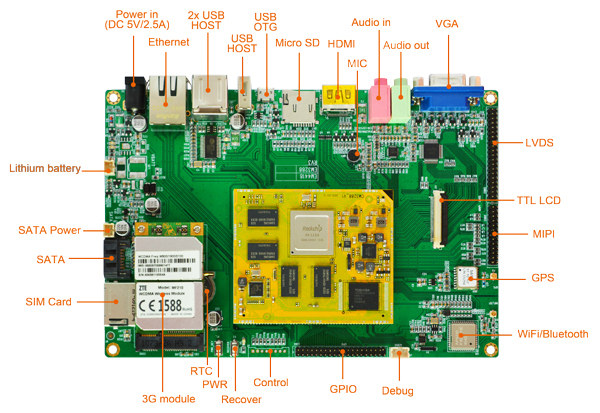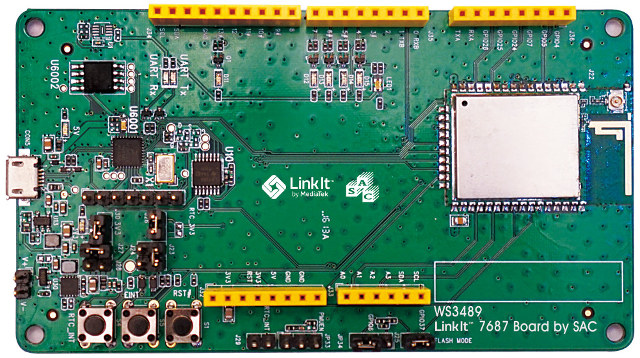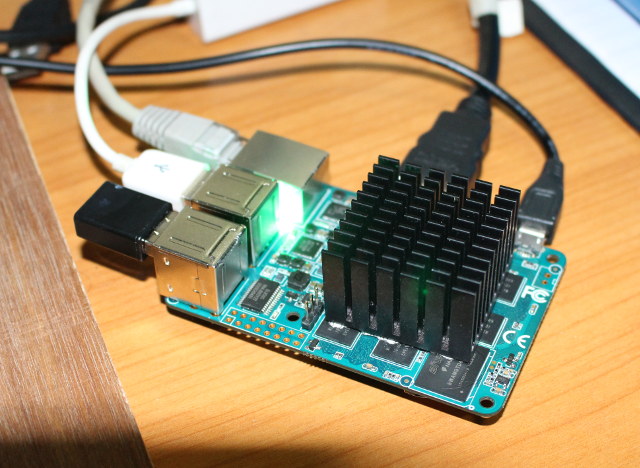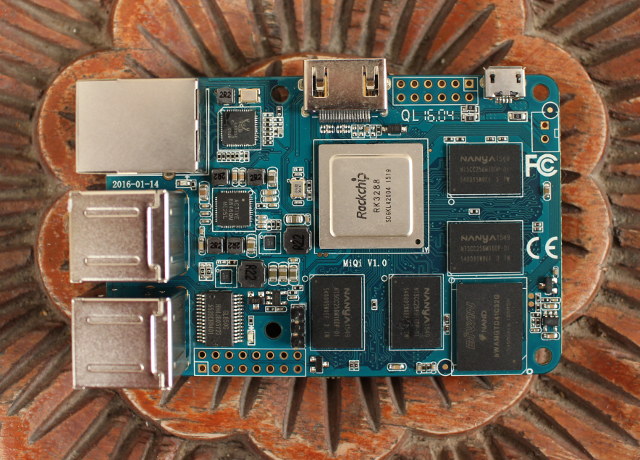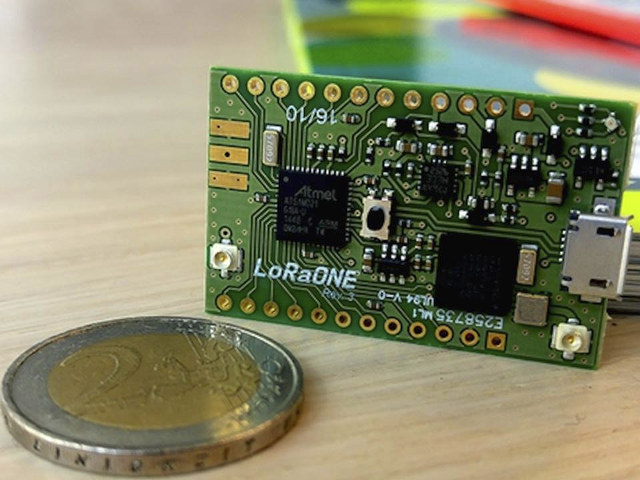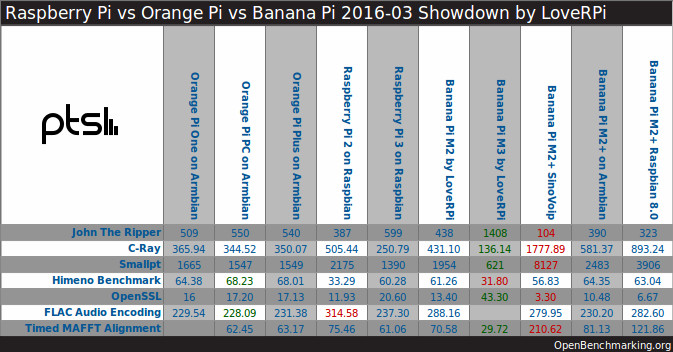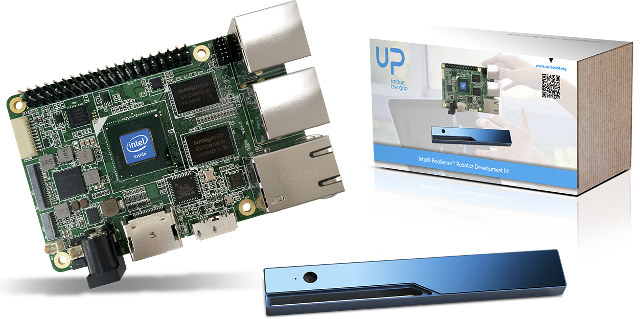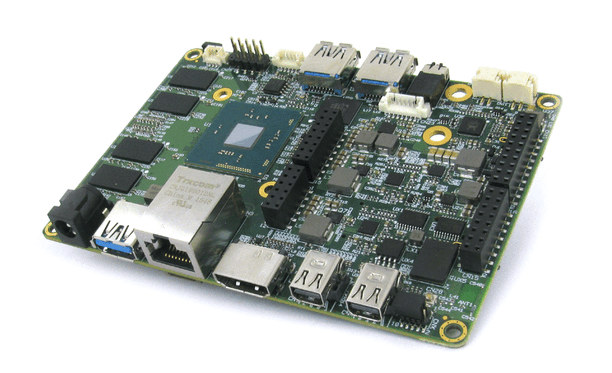Rockchip RK3288 is back in the news this month, and after the announced of MiQi low cost board a few days ago, an high-end Rockchip RK3288 SBC has come to market with Boardcon EM3288 comprise of MINI3288 CPU module, and a features-packed baseboard with multiple ports and connectivity options, including SATA and a 3G modem. EM3288 board specifications: SoC – Rockchip RK3288 quad core ARM Cortex A17 processor up to 1.8 GHz with Mali-T764 GPU System Memory – 2G DDR3 Storage – 8 GB eMMC flash, SATA, and micro SD slot Video I/O HDMI 2.0 up to 3840×2160@60p (provided your TV/monitor support YUV444) VGA 1x 26-pin MIPI connector, 1x 40-pin LVDS (multiplexed with VGA), 1x 40-pin TTL LCD connector Audio Output / Input – HDMI, Line IN and OUT 3.5mm jacks, and built-in MIC Connectivity Gigabit Ethernet Optional 8021.11b/g/n and Bluetooth4.0 via Ampak AP6212 module Optional 3G via ZTE MF210 […]
$20 MediaTek LinkIt 7687 Arduino Compatible WiFi IoT Board Runs FreeRTOS
MediaTek Labs has already launched several WiFi boards for IoT applications starting with LinkIt ONE, and later LinkIt Smart 7688 running OpenWrt, and the company is now about to launch LinkIt 7687 HDK (Hardware Development Kit) powered by Mediatek MT7687F Cortex-M4 SoC, running FreeRTOS, and developed & produced by Silicon Application Corp (SAC). LinkIt 7687 (WS3489) board specifications: SoC – MediaTek MT7687F ARM Cortex-M4F MCU @ 192MHz with 352 KB SRAM, 64KB ROM, and 2 MB serial flash in package, integrated security engine, and built-in 802.11n WiFi. 8×8 mm 68-pin QFN package Connectivity – 1×1 802.11 b/g/n WiFi with on-module PCB antenna and U.FL connector. USB – 1x micro USB for power, debugging (Coresight Debug Access Port + Virtual COM) Expansion Arduino Uno Rev. 3 headers + an extra 8-pin extension connector. Mass Storage Device (MSD) flash programming interface. Reserved headers for power consumption (current) measurement. Misc – LEDs for […]
Android and Linux Benchmarks on MiQi Development Board
MiQi is an upcoming low cost development board powered by Rockchip RK3288 SoC that will sell for $35 with 1GB RAM and 8GB storage, and $69 for the version with a 2GB / 32GB combination. Since Rockchip RK3288 was launched in 2014, most available benchmarks were made on Android 4.4, and since MiQi is the first low cost board based on the processor, other RK3288 based board such as FireFly have not been that popular. So I’ve decided to run updated benchmarks in MiQi both in Android 5.1 and Linux (Lubuntu 14.04), which was easy since a dual boot image is pre-installed. But since I received an early sample without heatsink, I found a spare heatsink added some thermal paste and placed it on top of the processor and partially on RAM and eMMC flash. MiQi Board Android 5.1 Benchmarks I ran Antutu both using 1080p60 and 2160p30 video output, […]
MiQi Rockchip RK3288 Development Board using Raspberry Pi Form Factor to Sell for $35 and Up
Rockchip RK3288 processor may have launched in 2014, but it’s still one of the most powerful processor found in TV boxes for example, and in the past we’ve seen higher end board based on the processor such as Firefly-RK3288 or Radxa Rock 2 Square selling for well above $100. But MQMaker, the company that previously made WiTi router board, is bringing a smaller and cheaper RK3288 development board with MiQi, which definitely looks similar to the Raspberry Pi. MiQi board specifications: SoC – Rockchip 3288 quad core ARM Cortex A17 up to 1.8 GHz with Mali-T764 GPU supporting OpenGL ES 1.1/2.0 /3.0, and OpenCL 1.1 System Memory – 1 or 2G DDR3 depending on model Storage – 8 or 32 GB eMMC flash depending on model + micro SD slot Video & Audio output – HDMI 2.0 up to 3840×2160@60p Connectivity – Gigabit Ethernet USB – 4x USB 2.0 host ports, 1x micro USB port Debugging […]
LoRaONE is a Small LoRa IoT Development Board Based on Atmel SAMD21 MCU, Microchip LoRaWAN Module (Crowdfunding)
While there are many long range LPWAN standards, LoRa appears to be one of the most popular with boards such as LoPy, and now SODAQ LoRaONE module hitting crowdfunding campaigns. LoRaONE is powered by an Atmel Cortex M0+ micro-controller, features Microchip RN2483 or RN2903 LoRaWAN module, GPS, and various sensors. LoRaONE board specifications: MCU- Atmel ATSAMD21G18 ARM Cortex M0+ micro-controller @ 48 MHz with 256 KB flash memory, 32KB SRAM, and up to 16 KB EEPROM (by emulation) Connectivity LoRa via Microchip RN2483 (433/868 MHz) or RN2903 (915 MHz) module depending on your region GPS via u-blox EVA 7M USB – 1x micro USB port for power and programming Expansion headers (unpopulated) 14x digital pin, 12x for analog and 8x for PWM, plus UART, SPI and TWI (I2C) Analog output pin – 10-bit DAC External Interrupts: Available on all pins DC Current per I/O pin: 7 mA Operating Voltage – […]
Software Matters, or How SinoVoIP Crippled Banana Pi M2+ Performance.
The most common way to use a development board is to simply go to the manufacturer website, and download the images from there. They are the ones who made the hardware after all, and they should be the most knowledgeable about their platform. But it may not always be true as tkaiser found out when he ran some Phoronix benchmarks on Banana Pi M2+ (aka BPI M2+) board with SinoVoIP (the manufacturer), Armbian, and Raspbian images. The results speak for themselves. The last three columns are what is of interest here, and in some benchmark Banana Pi M2+ is about 3 times slower with SinoVoIP image compared to Armbian, while with others the performance is quite similar. John The Ripper password cracker benchmark shows a massive difference between distributions… … while FLAC audio encoding not so much. So what’s going on here? First Jon the Ripper is a multi-threaded applications, […]
Intel RealSense Robotic Development Kit Features Atom x5 UP Board, Realsense R200 Depth Camera
An Intel Developer Forum is currently taking place in Shenzhen, China, which may explains why we have several Intel products announcements targeting developers such as the launch of Quark D2000 development board. Another product for makers and developers is Intel RealSense Robotic Development Kit combining Raspberry Pi like UP Board powered by Intel Atom x5-Z8350 processor with Intel RealSense camera (R200) in order to bring 3D / depth vision to robots. UP Board specifications have changed a little as the processor is now Z8350 instead of Z8300, and they now have a version with 4GB RAM used in the kit: SoC – Intel Atom x5-Z8350 “Cherry Trail” quad core processor @ 1.44 GHz (Burst frequency: 1.92 GHz) with Intel Gen8 HD graphics System Memory – 4GB DDR3L-1600 Storage – 32 GB eMMC flash Video Output / Display – HDMI 1.4b, MIPI DSI/eDP interface Audio I/O – HDMI, I2S Connectivity – […]
UDOO x86 Development Board Combines Quad Core Intel Motherboard with Arduino 101 Board for $89 and Up (Crowdfunding)
UDOO is known for their ARM based development board with an MCU to control I/Os from Arduino compatible headers such as UDOO Quad or UDOO NEO. The community has now launched a new board called UDOO x86 powered by a quad core Intel processor, and integrating the Intel Curie compute module with Quark SE MCU used in Arduino 101, and the Arduino UNO headers. The basic version will come with Atom x5-E8000 Cherry Trail Braswell processor while the advanced version will feature Celeron N3160 Braswell processor. UDOO x86 Basic and Advanced specifications: SoC Basic – Intel Atom x5-E8000 quad core processor @ 1.04 / 2.0 GHz GHz with 12EU Intel HD graphics @ 320 MHz (5W TDP) Advanced – Intel Celeron N3160 quad-core processor @ 1.6 GHz / 2.24 GHz (Turbo) with 12EU Intel HD graphics@ 320 MHz/640Mhz (4W SDP / 6W TDP) System Memory Basic – 2 GB DDR3L […]


